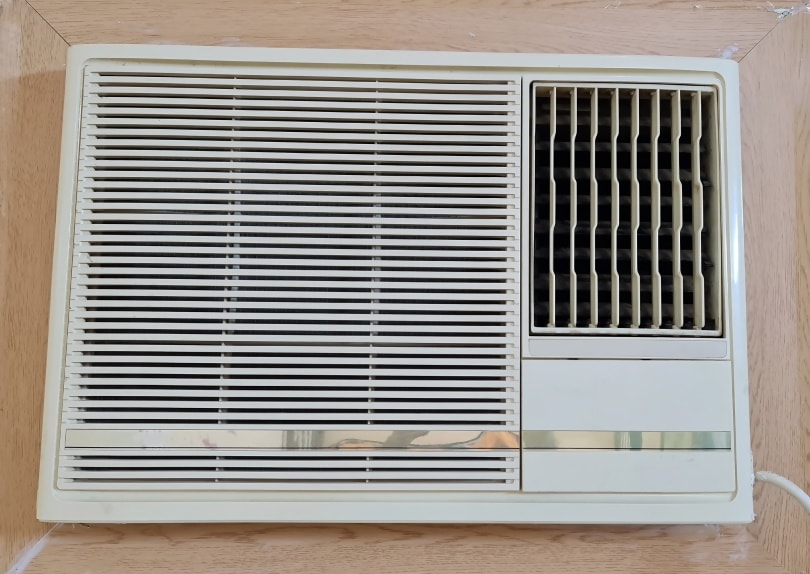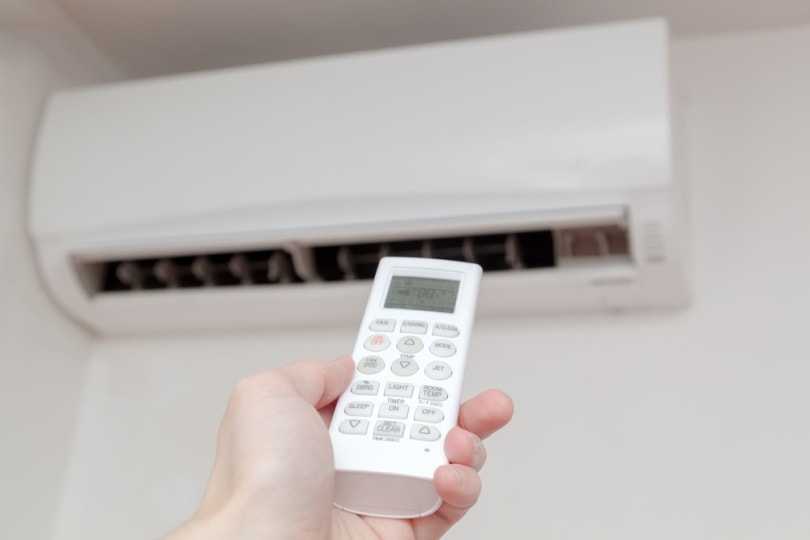What Is Dirty Sock Syndrome? (2025 Guide)
-

- Last updated:

Bad odors in your home can be difficult to deal with, especially when you don’t know what the cause may be. One odor issue that’s common to homes and apartments is referred to as dirty sock syndrome.
You may have heard the term thrown around by contractors or HVAC professionals when describing cleaning services or treating HVAC-related issues. But what is dirty sock syndrome? And what causes it? This is a term used to describe a common mold issue that homeowners may face which causes their home to have an odor similar to that of dirty socks. We’ve done a bit of research on this issue, and we will go over what it is, how to get rid of it, and how to prevent it.
What AC Issues Cause Dirty Sock Syndrome?
The issue is caused by air conditioners becoming dirty and riddled with mold and bacteria.
Over time, environmental factors can cause mold, mildew, and bacteria to build up inside the coils and other inner components of the A/C system. When this happens, the blower will force air through any bacteria and emit a rather foul-smelling odor when the unit is turned on. This can be particularly concerning to those with allergies or respiratory disorders, or people who are immunocompromised.
Many people believe that this issue will disappear on its own. However, this is never the case. The issue can only be eliminated by thorough, deep cleaning to remove mold and bacteria–and in some cases, partial or complete system replacement.

The 4 Common Parts That May Cause Dirty Sock Syndrome
1. The Evaporator Coil
In many cases, the bad smell associated with dirty sock syndrome is often the result of dirt buildup on the unit’s evaporator coils. Bacteria and fungus can grow around the coils and can cause smell issues eventually if left untreated. It can also make the air conditioner work harder to cool it and take longer to reach a comfortable temperature–leading to higher bills. This is why cleaning the coils is so important.
How to Clean Evaporator Coil
The evaporator coil of an A/C is located in the interior portion of the HVAC system near the air handler. If it gets dirty, you can clean it. Although you might be able to access it by yourself, it is not an easy task. The unit’s casing houses the evaporator coil, so in many cases it’s best to call a professional to open the air conditioner to check if it is dirty so they can clean it for you.
If you are interested in attempting it yourself, here are some options:
Use a Commercial HVAC Cleaner
You can buy these cleaners from home improvement stores such as Lowe’s and Home Depot. Always follow the instructions on the commercial cleaner label. In most cases, you’ll need to allow the cleaner to sit for a while and let it foam up until all the debris and foam has drained away. Continue to apply the cleaner until all the debris is gone. Repeat this process if needed.
Use Homemade Cleaner
You can also use mild dishwashing soap (or laundry detergent) and water if you don’t want to use commercial cleaners. Simply mix about 2 teaspoons of detergent and water in a spray bottle. Spray the solution onto the coils and then let it sit for a while to get rid of any grime. Next, clean up any dirt or debris with a lint-free cloth.
Note that you may need to use strong-duty chemicals if your coils are so caked with dirt that they’ll need a penetrating solution. And usually, if this is the case, it’ll be much easier to call a licensed professional at this stage.
2. The Air Filter
A dirty filter in your air system can also cause dirty socks syndrome and dirty coils. To keep your system running smoothly, HVAC experts recommend that you change your filter at least twice per year. Though you should change your filter more frequently if you live near dusty areas or where pollen can be a problem.
Dirty filters are really just another place where dust can gather. All that outdoor dust will eventually find its way to the unit’s coils. A clean filter can help prevent buildup and dirty socks syndrome as a result.
The kind of filter you use also plays a part in preventing this issue. Some filters can be washed with soap and water, while others will need to be changed out. Always follow the manufacturer’s recommendation for your a/c unit.
Note that dirty filters can also exacerbate health issues for anyone in your home with allergies, asthma, or any other breathing problems. The “dirty socks syndrome” is really more than just an unpleasant smell in your home, it indicates that there are extra irritants in your home’s air system.
3. The Drain Line
Dirty sock syndrome can also be a result of issues with your unit’s drain line. This line prevents condensation from building up inside the air conditioning unit. Water vapor in the air condensed into water droplets when it hits your HVAC unit’s cooling coil. These small drops travel to a drain pan that collects the water and allows it safely to flow into a drainpipe.
If your line is blocked, the water will not have a place to go. And a clog can not only cause a mess in your basement or at, but it can also cause the development of mold and bacteria, which ultimately causes dirty sock smell. When your registers push into your home, they push this foul air as well.
To prevent this, you should inspect your drain line at least once a year to make sure it’s not clogged with leaves, dirt, or any other debris. Flush the line with vinegar or diluted bleach (in a 1:20 ratio) after clearing it to prevent mold from developing. Vinegar is typically recommended more than bleach because the latter can damage copper tubing, and cause damage to your flooring if it spills.
It’s also a good idea to have an annual AC maintenance contract. A professional technician will inspect the drain line, clean it, and inspect it for any other system repairs.
4. Dirty Air Ducts
Dirty air ducts can also be the culprit of dirty sock syndrome. Same with other parts of the air conditioning system, debris can accumulate within the ducts and as a result, it may circulate throughout the home whenever the unit is turned on.
In addition to ridding your HVAC system of bad smells, cleaning your air ducts also has additional benefits.
Benefits Of a Clean Sock Syndrome
More Efficient System
When the dirt and dust levels get too high within the air ducts, it can cause severe restriction in the airflow from the air conditioner or furnace. In extreme cases, this can cause airflow to be cut off completely.
This means that your heating and cooling systems will have to work harder in order to produce the right temperature inside your home. Your system can suffer unnecessary wear, which could lead to costly repairs and premature component failure. Cleaning your ducts with air ducts may save you money over the long-term.
Better Air Quality
Dirt and dust can be annoying, and it can be dangerous. Mold spores and mildew, as well as pollen, bacteria, can get into your ducts and spread throughout your home, which can cause allergies and other health problems. Your air ducts may also be contaminated by mold with spores that can cause irritation to your lungs and skin in some cases.
Lower Utility Bills
If you’ve noticed an upward hike in your electric or gas bills every month, the air ducts may be the reason. An HVAC system will work more efficiently if it has clean, clog-free ducts. The system’s efficiency will reduce the amount of electricity and power needed to cool or heat your home.
Getting your ducts cleaned can range from $250 to $600 depending on the size of your home. However, it’s definitely worth it to keep your air quality clean if your utility bills are soaring because of it.
Helps You Spot Other Potential Problems
It’s easier to spot other issues when your air conduits are clean. Imagine that you suspect there is an air leak in your ductwork and the technician comes to inspect it and finds that there is in fact a leak. A proactive approach to maintaining your HVAC system allows you to fix a problem before it becomes a bigger problem.
Conclusion
Dirty sock syndrome can affect any home or apartment that has a central air system or mini-split unit. Fortunately, this issue is both preventable and treatable in many cases.
The cause of this odor is simply the buildup of mold and bacteria. It’s for this reason that HVAC professionals recommend having your AC system cleaned out once or twice a year. This includes the air conditioner itself as well as the ductwork around your home. Doing so can also save you money and help your system to last longer.
- https://onehourheatandac.com/dirty-sock-syndrome
- https://indoortemp.com/resources/dirty-sock-syndrome
- https://www.princetonair.com/blog/what-dirty-sock-syndrome-how-do-i-fix-it#
- https://mcgowansac.com/why-you-need-to-understand-dirty-sock-syndrome/
- https://www.designair.co/blog/5-big-benefits-of-air-duct-cleaning/
Featured Image Credit: Kamran Younus, Shutterstock
Contents

